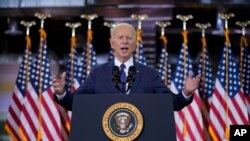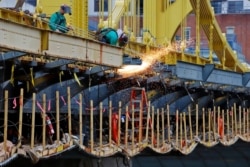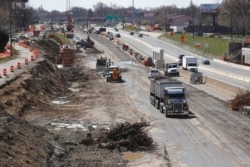A domestic jobs and infrastructure plan with a price tag of $2 trillion was unveiled on Wednesday by President Joe Biden.
“Our infrastructure is crumbling,” the president said during a speech in Pittsburgh, the second most-populated city in the state of Pennsylvania, which has emerged from the downfall of the domestic steel industry.
“It’s going to create the strongest, most resilient, innovative economy in the world,” Biden predicted of his American Jobs Plan, which emphasizes union-backed employment.
The plan is intended to put the United States in a position to out-compete China, which Biden said, along with other countries, “are eating our lunch.”
“Our adversaries are worried about us building this critical infrastructure,” he said, noting that the decline in America’s gross domestic product means “the rest of the world is closing in, and closing in fast."
The U.S. economy shrank by 3.5% in 2020 because of the coronavirus pandemic, according to government figures.
The president’s plan envisions, over a span of eight years, repairing 32,000 kilometers of roadways, 10 economically significant bridges and 10,000 smaller ones, getting rid of dangerous lead pipes in water systems and significantly upgrading the country’s electrical grid, computer broadband and transit systems.
Speaking for more than half an hour at the Carpenters Pittsburgh Training Center, Biden said, “I'm convinced that if we act now, in 50 years people are going to look back and say, ‘This was the moment that America won the future.’”
The plan comes on the heels of Biden gaining congressional approval of a $1.9 trillion coronavirus relief deal solely on the strength of the votes of Democratic lawmakers over unified Republican opposition.
To pay for the infrastructure plan, Biden, in part, is proposing raising the corporate tax rate from 21% to 28%, reversing tax cuts made by then-President Donald Trump four years ago.
“No one should be able to complain about that,” Biden said during his Pittsburgh speech.
Republicans in Congress, however, are raising objections, arguing this would hurt American workers, slow economic growth and make U.S. companies less competitive in the world market.
Biden wants the support of Republicans for the plan, White House deputy press secretary Karine Jean-Pierre told reporters on Air Force One during the flight to Pittsburgh.
“He knows how to reach to the other side and make good things happen,” she said of the president.
“It’s like a Trojan horse,” Senate Minority Leader Mitch McConnell told reporters in Erlanger, Kentucky, earlier Wednesday. “It’s called infrastructure, but inside the Trojan horse, it’s going to be more borrowed money and massive tax increases on all the productive parts of our economy.”
While Congress has already begun a bipartisan process to reauthorize federal surface transportation and water programs, there is no guarantee the decadeslong history of such cooperation will continue for the overall infrastructure package.
“We need to be able to enact investments in infrastructure to provide safe drinking water, broadband access and safer roads, and doing so requires both parties’ buy-in. We hope the president will support the congressional committees working together to produce bipartisan legislation,” Michele Nellenbach, vice president of strategic initiatives at the Bipartisan Policy Center, told VOA.
“Investments in infrastructure have long been bipartisan, and in that spirit, we hope to craft and pass an historic package to Build Back Better: creating jobs, justice and opportunity for all,” House Speaker Nancy Pelosi said.
The U.S. Chamber of Commerce, among the most powerful business groups in Washington, is calling Biden’s proposal “dangerously misguided when it comes to how to pay for infrastructure.”
In a statement, the organization’s executive vice president and chief policy officer, Neil Bradley, said, “We strongly oppose the general tax increases proposed by the administration, which will slow the economic recovery and make the U.S. less competitive globally — the exact opposite of the goals of the infrastructure plan.”
“Raising taxes on manufacturers would fundamentally undermine our ability to lead this recovery,” Jay Timmons, National Association of Manufacturers president and CEO, said in a statement.
“To gain bipartisan trust, this giant spending proposal needs an oversight body such as a National Infrastructure Board that will safeguard against partisan pork and waste and help cut through red tape delays,” Philip K. Howard, chair of Common Good and one of the authors of Trump’s infrastructure bill, told VOA.
A coalition of dozens of unions, religious, policy and advocacy organizations (including the AFL-CIO and the National Organization for Women), however, is supportive of the overall plan and how to pay for it.
In a letter to Biden and Vice President Kamala Harris, the groups stated that “public opinion polls show raising taxes on the wealthy and corporations is very popular even among rank-and-file Republicans.”
For some progressive and environmental groups, the Biden package is insufficient. Some have suggested spending five times what the president proposes — up to $10 trillion.
“The funding levels outlined in the White House plan are simply inadequate to meet the essential task of replacing our nation’s crumbling water infrastructure, while assuring clean, safe and affordable water for all,” Wenonah Hauter, Food & Water Watch executive director, said.
Much of Biden’s package focuses on green infrastructure to respond to climate change. Part of the plan is aimed at research and development in such sectors as batteries.
“The U.S. market share of plug-in electric vehicle (EV) sales is only one-third the size of the Chinese EV market. The president believes that must change,” according to the White House.
A second economic package is expected to be announced by Biden in about two weeks. It is to focus on health insurance coverage, child care subsidies and free access to community colleges.







